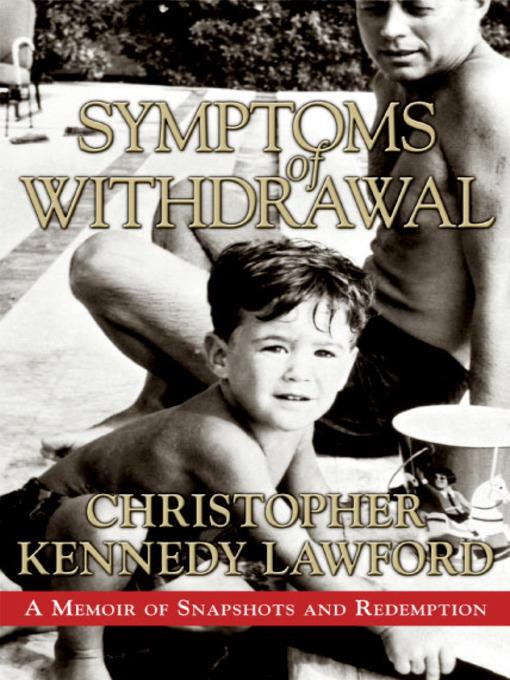
Symptoms of Withdrawal
A Memoir of Snapshots and Redemption
کتاب های مرتبط
- اطلاعات
- نقد و بررسی
- دیدگاه کاربران
نقد و بررسی

July 18, 2005
Reviewed by Sara Nelson
Pity the poor shelver who has to decide where to put this book. Does it go with the wall full of Kennedyana, the tell-alls and critiques of the family America loves to hate and hates to love? Or does it go into the ever increasing "recovery" section of the memoir department, packed as it is with tales of debauchery, and finally, painful and hard-won sobriety?
Because this offering, by the 50-year-old nephew of President Kennedy, son of the late actor Peter Lawford, and cousin of the late American prince, JFK Jr. (how's that for a legacy to live with?), is both of those things, it is hard to categorize, and harder to resist. There's plenty of dish here, even if it is dish of the gentle, almost old-fashioned variety. (Lawford tells of being taught to do the twist by Marilyn Monroe; of spying, as a 10-year-old, on a former First Lady taking a bath, of partying with Kennedys and Lennons and Jaggers.) But it is also a palpably painful and moving rendition of bad behavior with women and money and drugs, and 20 years of staying sober.
If you've read any recovery lit, you already know the drill: the stories of lying and charming and messing up school, jobs and relationships. There's plenty of that, but in Lawford's case, the backdrop against which he misbehaved is in itself dramatic. He writes achingly of his relationship with his cousin David, RFK's son, with whom he regularly did drugs and who died in a Palm Beach hotel room in 1984. (Lawford broke with Kennedy family tradition and named his son for David.) When he arrives high at a family party, the photographic proof turns up in the newspaper—because it was a fundraiser for his uncle Teddy. If this were somebody with a less famous-for-carousing name, you might think he was just another self-dramatizing alcoholic; as it is, Lawford is clearly just recounting his life.
Even so, he could come off as obnoxious—were it not for his frankness, humor and self-awareness. Lawford goes out of his way to own, as they say in recovery, his behavior, and while he acknowledges a family tendency, he blames no one but himself. He can also write knowingly and self-deprecatingly about his competitive relationships with his many cousins, his vanity as an actor (he has appeared in films including The Russia House
and Mr. North
, as well as many television programs but is, by his own admission, no Tom Cruise), and his tendency to refer to his many female conquests as "the most beautiful girl in the world."
So where does this book belong? Does it matter? You don't have to care about Kennedys to find this a moving tale of self-discovery and redemption. Whatever else he may have been—son, nephew, cousin, etc.—Christopher Lawford shows himself here to be a writer of talent and grace. 32 pages of photos. (Oct.)
Sara Nelson is the Editor-in-Chief of
PW.

September 15, 2005
Born into wealth and favor as the son of Rat Pack actor Peter Lawford and JFK's sister Patricia, 50-year-old Lawford writes an engaging memoir of privilege, struggle, and recovery. The privilege meant growing up among such Hollywood elite as Frank Sinatra and Marilyn Monroe and on the Washington scene among the Kennedys. All the while, he was trying to find his own identity. But in his dysfunctional family, bonding with dad included receiving a vial of cocaine for his birthday. Lawford writes about his struggle with and recovery from the oblivion of alcohol and drug addiction, an "800-pound gorilla" made heavier by his family legacy. For Lawford and cousin David (RFK's son), being anonymous panhandlers and heroin junkies was sometimes easier than being Kennedys. After David was found dead of an overdose in 1984, Lawford's aunt, Joan Kennedy, brought him to a church basement, where he was disabused of his professed "terminal uniqueness" as he listened to others share strikingly similar tales of addiction. (He has maintained his sobriety for 20 years.) Thoughtful, honest, and at times humorous, Lawford's memoir is recommended for public libraries. [See Prepub Alert, "LJ "6/15/05.] -Patti C. McCall, Albany Molecular Research, Inc., NY
Copyright 2005 Library Journal, LLC Used with permission.

























دیدگاه کاربران